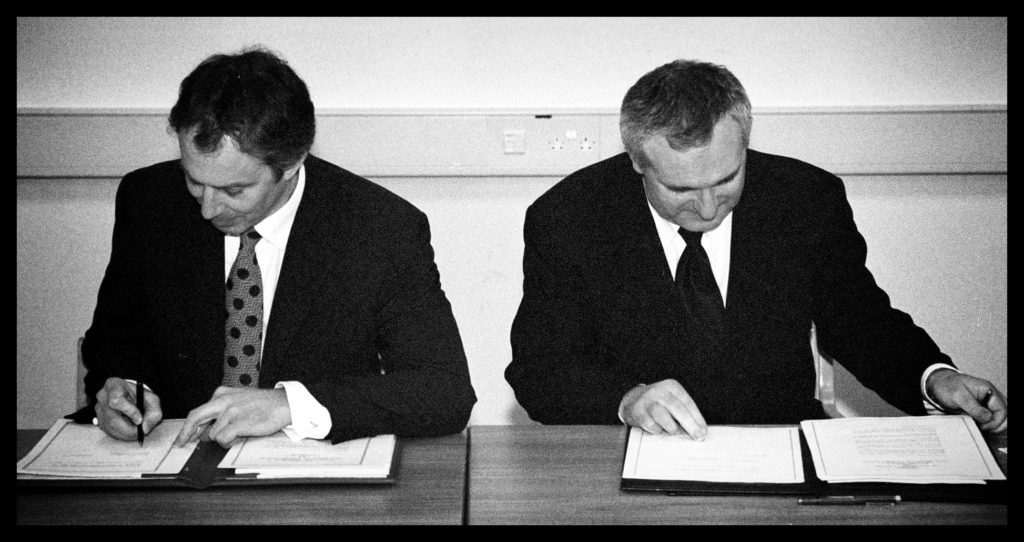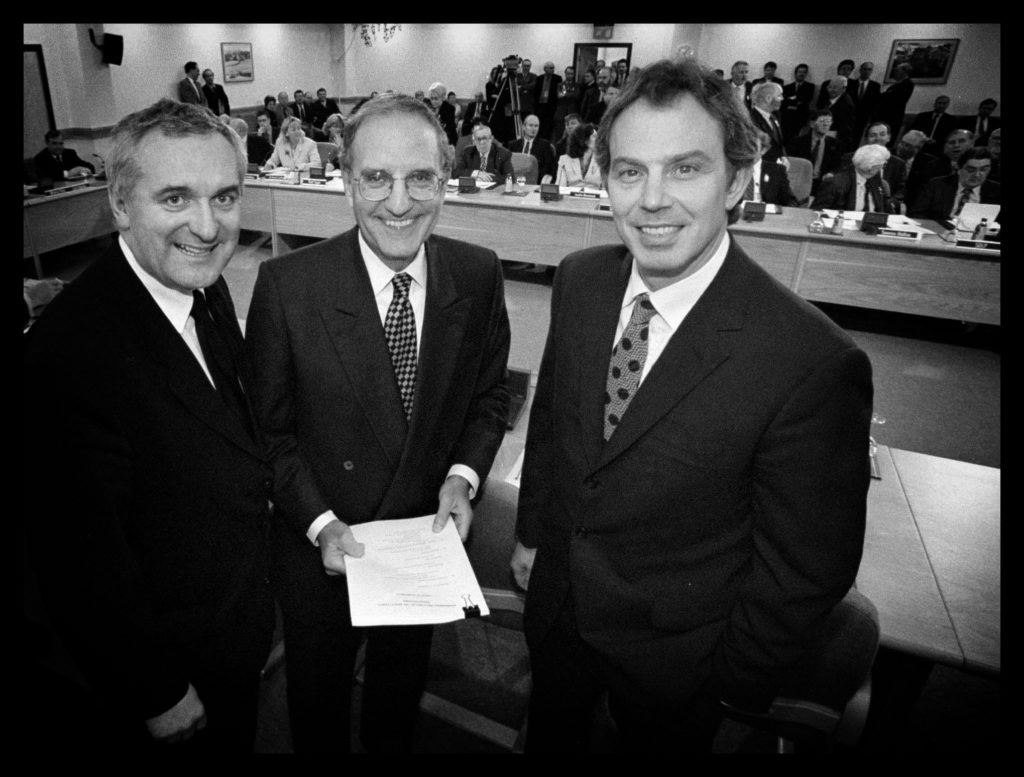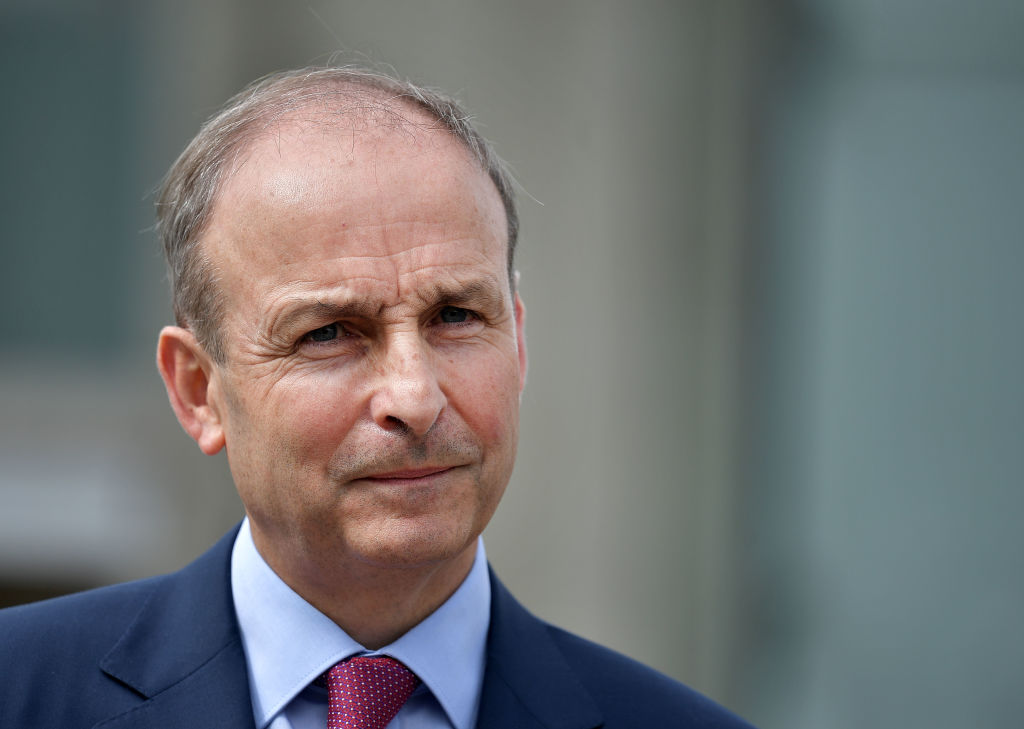THE Good Friday Agreement was “high politics at its best”, claims Tánaiste Micheál Martin.
Reflecting on the impact of the peace accord on the 25th anniversary of it being signed, Mr Martin praised those who had to make “difficult choices” to achieve what was previously deemed impossible.
“Twenty-five years ago, difficult choices, hard compromises and real leadership achieved what some thought impossible, peace in Northern Ireland,” he said.
“Today, our island is at peace,” he added, “those difficult choices were worth it.
“And while that peace is imperfect, life on this island, and in particular Northern Ireland, is so much better.”
 Taoiseach and Fianna Fail leader Bertie Ahern (right) and British Prime Minister Tony Blair, at Castle Buildings Belfast, signing the peace agreement which would allow the people of Northern Ireland to decide their future
Taoiseach and Fianna Fail leader Bertie Ahern (right) and British Prime Minister Tony Blair, at Castle Buildings Belfast, signing the peace agreement which would allow the people of Northern Ireland to decide their futureMr Martin, who is also Ireland’s Defence Minister and Foreign Affairs Minister, was speaking at a cultural event hosted by the Irish government this week marking the historic anniversary.
The Sharing Peace, Sharing Futures event, held at the Abbey Theatre, celebrated the “diverse set of voices and perspectives on this island”.
In a speech made at the event the Tánaiste recalled the experience of living through the Troubles and the peace process in Ireland.
“Our childhood and teenage years in the Ireland of the late sixties and seventies were shaped and impacted by the Troubles,” he said.
“Our daily diet on television was one of bombs, bullets, beatings; massacres, murder, and mayhem – and above all, no sense of it ever ending.”
He added: “The announcement of the Downing Street Declaration was akin to a miracle.
“We had to pinch ourselves repeatedly to believe it was actually happening.
“Between then and the Good Friday Agreement, it faltered and hung in the balance.
“The Good Friday Agreement itself was high politics at its best: compromise, parity of esteem, understanding where the other side was coming from.
“Painstaking negotiations, patience, perseverance, courage, emotional intelligence – all in evidence.”
 l-r Taoiseach and Fianna Fail leader Bertie Ahern with Senator George Mitchell and British Prime Minister Tony Blair at Castle Buildings Belfast, after they signed the peace agreement
l-r Taoiseach and Fianna Fail leader Bertie Ahern with Senator George Mitchell and British Prime Minister Tony Blair at Castle Buildings Belfast, after they signed the peace agreementMr Martin went on to tell those gathered that it was such political drama and expertise that drew him into the world of politics.
“I became drawn into it, fascinated by it – absorbed,” he explained.
“I’ve often said that it was Northern Ireland that drew me into politics.
“Northern Ireland has also shaped and reshaped my politics,” he added.
He went on to recall his own experiences of the North as a young politician.
“As a young backbencher I travelled North, meeting other young politicians from all sides, in quiet places. “We met without intrusion. We didn’t have mobile phones then,” he said.
“Coming from the other end of our island, I knew that I had much to learn – and I realised, too, that I had things to unlearn.
“As someone with a republican background, my encounters initially with unionists challenged me,” he admitted.
“But I grew to understand the complexity of identity on our island and learned to challenge some people with perspectives closer to my own.
“I remember being taken by the decency, humour and good grace of ordinary people from all sides. A people trapped in history for too long. A people yearning for a better future,” he added.
 Tánaiste Micheál Martin admits it was the peace process in Northern Ireland that drew him to politics
Tánaiste Micheál Martin admits it was the peace process in Northern Ireland that drew him to politicsMr Martin went on to reveal the most “moving” day of his political career to date was the day the Good Friday Agreement was signed.
“I have been honoured to work on Northern Ireland matters over the course of my career, including as Taoiseach and as Minister for Foreign Affairs,” he said.
“My involvement in the Hillsborough talks, which enabled the devolution of policing and justice – something impossible to agree in 1998 – taught me a lot.
“But one of my most moving days in Cabinet was when the multiparty negotiations concluded, on Good Friday, 25 years ago.
“I remain in awe of the leadership shown by those who took chances for peace – the courage of those assuming risks for their parties and themselves, to bring their followers with them.
“Leadership was not just political. It was in communities, in churches,” he added.
“Above all the women of Northern Ireland said enough was enough.
“People were mobilised by 30 years of trouble and tragedy to do better by their communities.”

